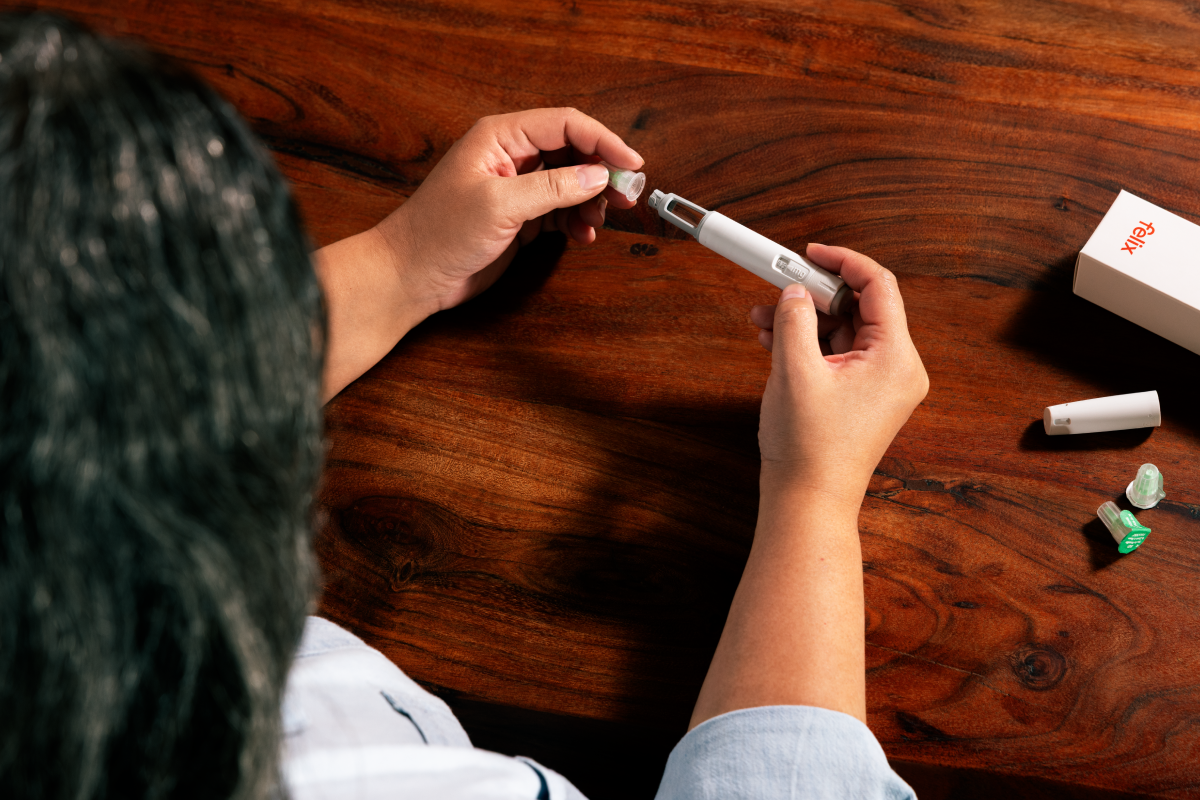Download the Felix App
Earn reward, visit our shop and get exclusive offers on the app
Download nowEarn reward, visit our shop and get exclusive offers on the app
Download nowPut your health first in 2026 with free visits on all categories, and $200 off longevity testing.
Download nowPut your health first in 2026 with free visits on all categories, and $200 off longevity testing.
Download now
AI-generated summaries may be inaccurate and do not constitute medical advice. Third-party AI tools are not under Felix's control, and your use of them is at your own risk.
Some of the most common symptoms of PCOS include cysts on the ovaries, irregular periods, difficulty getting pregnant, excessive hair growth, acne, and weight gain.
Weight loss is often one of the first treatment recommendations made for those with PCOS and overweight, and can lead to an improvement in PCOS symptoms in many patients. But losing weight with PCOS can be challenging.
It’s important to realize that not all patients with PCOS have overweight and there are many patients with PCOS who have insulin resistance independent of their body size.
With PCOS, weight loss is difficult because excess insulin causes your body to store fat and can make you feel hungrier.
It’s thought that PCOS develops in response to abnormal hormone levels. One of the most common hormonal issues with PCOS is insulin resistance, with studies showing that between 50% and 90% of people with PCOS have insulin resistance.
Insulin is a hormone that’s released after you eat. It controls the amount of sugar in the blood. Insulin resistance means that the body has become less sensitive to insulin. As a result, the body produces extra insulin to compensate.
When there is too much insulin, the body produces extra testosterone. This interferes with ovulation and can cause some of the other symptoms of PCOS, such as abnormal hair growth. Excess insulin can also lead to weight gain. Weight gain makes PCOS symptoms worse because excess fat tissue makes the body produce even more insulin. It’s a vicious cycle that can be hard to break free from.
In addition to causing your body to store fat, insulin also acts as a signal that causes you to feel hungry. Since there is excess insulin circulating with PCOS, you receive more signals to eat, which can lead to eating more than your body needs. Over time, this can lead to difficulties with weight management and often weight gain.
While it can be difficult to lose weight with PCOS, weight loss remains one of the main treatments for PCOS. Losing even just 5% of your body weight can often lead to significant improvement in PCOS symptoms. Weight loss is typically achieved through changes to diet and lifestyle, and in some cases, by taking medication.
The main ways to lose weight with PCOS are through lifestyle modifications and medication.
Protein: A study looking at the effect of high protein diets on weight and body fat loss for people with PCOS found that people following a high protein diet (40% of total calories from protein) lost more weight and body fat than people following a standard protein diet (15% of total calories from protein). Healthy, high-protein foods include poultry, seafood, meat, dairy, nuts, and pulses.
Fibre: Another study found that women who had PCOS and ate more fiber had lower insulin resistance, less body fat, and less belly fat. Healthy, high-fibre foods include whole grains, fruits, vegetables, nuts, and seeds.
Overall, it appears that eating a diet high in protein and fibre and low in added sugars and starches, can be beneficial for PCOS weight loss.
Metformin, which is typically used to treat type 2 diabetes, is often used to lower insulin and blood sugars in people with PCOS. It has also been shown in some studies to help people with PCOS who have overweight lose and maintain weight.
Orlistat is an oral medication that blocks the enzyme that breaks down fats in your diet. The undigested fat passes out of your body when you have a bowel movement. Because fewer calories are absorbed, it can help with weight loss. One study showed that taking orlistat leads to significant weight loss in people with PCOS who have overweight.
Acarbose is an oral medication that works in your intestines to slow down the absorption of carbohydrates. It is typically used in combination with other medications to treat type 2 diabetes, but a small study in people with PCOS found it helped people with PCOS and obesity lose weight.
Liraglutide and semaglutide are injectable medications that can help people with overweight or obesity lose weight. They work in many ways, to help with insulin resistance, blood glucose control and weight management. Studies show that when used in people with PCOS, weight loss medication such as liraglutide is effective for promoting weight loss.
Overall, there are several medications that could help your weight management with PCOS. If you’re interested in taking PCOS weight loss medication, speak with a licensed Canadian healthcare practitioner.
Since insulin resistance is one of the symptoms of PCOS, avoiding foods that can spike your blood sugar may help with controlling your sugar levels and weight management.
One way to do this is to make lower carb and lower sugar food choices. Many find it helpful to use the glycemic index system to do this. The GI is a system that rates foods containing carbohydrates based on how quickly the food affects your blood sugars when you eat it on its own.
Foods containing carbohydrates that are quickly broken down by your body and cause a quick increase in blood sugar are high GI foods. If you’re trying to lose weight with PCOS, limiting these foods could be helpful.
Some high GI foods include:
However, it’s important to note that the GI only looks at how a food impacts your blood sugars when you eat that food by itself. By combining high GI foods with foods that reduce the rise in blood sugar (like proteins or fats), you’ll slow down the absorption of carbohydrates, leading to lower blood sugar levels.
Here are some examples of how some people include high GI foods:
Another option to reduce the GI of a food is to opt for the whole-grain version (for example, switching white bread for whole wheat bread). The whole-grain versions of these foods are lower GI because they contain more fibre. Fibre also slows down the absorption of carbohydrates, leading to a lower rise in blood sugar.
Rather than focusing on foods to avoid with PCOS, focus on all the nutritious foods you can include in your diet. Some of the best foods to include to help manage insulin resistance and weight include:
One meal is not going to make or break your health. By making small sustainable changes, you can improve your health gradually. Remember, people with PCOS can often see a positive impact on their symptoms.
The best diet for PCOS and weight management is a healthy, sustainable balanced diet combined with regular physical activity. Here are some tips to get you started:
High levels of insulin can make it difficult to manage your weight with PCOS, but weight loss is still possible. By eating a balanced diet high in protein and fibre and engaging in regular exercise, you may be able to lose weight. medications are also often helpful for weight management.
If you’re struggling to lose weight with PCOS, you don’t have to go it alone. Consider reaching out to a licensed Canadian healthcare practitioner who can help you on your weight loss journey.
Medically reviewed by
References




























